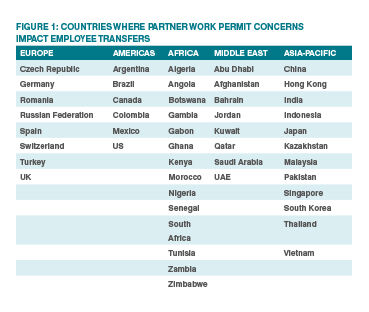The challenges of dual-career couples
Dual-career couples are a fact of 21st-century life. In this abridged version of a white paper, Graebel Relocation considers how this trend is affecting global relocation and international assignments.

Women's new career roles
Women are playing a dominant role in the dual-career relationship. In the US, their participation in the family economy has grown incrementally over the last few decades. The percentage of women in dual-earner marriages who out-earn their husbands went from 19.2 per cent in 1990 to 23.3 per cent in 2000 to 28.1 per cent in 2011.Managing dual-career relationships involves a series of trade-offs between career growth, professional endeavours and commitments to family and community. Couples can struggle with the trade-offs, not only between work and personal life, but also between their careers. Their lives are filled with negotiation.Dual-career moves for Millennials
While the pursuit of wealth and two incomes is beneficial, dual careers restrict mobility – especially international moves. As reported by Forbes, Millennials in dual-career relationships find that this scenario leads to more responsibilities both at work and at home, presenting significant challenges for workers and organisations that need to attract and retain talented workers.Globally, talented workers are in high demand. That means that they are increasingly willing to change jobs if they don't have solid opportunities to climb the corporate ladder or advantages like f lexible schedules and relocation options.A PwC report finds that 69 per cent of female Millennials would like to work outside their home country during their careers, and 63 per cent of women feel that international experience is critical to furthering their careers. PwC predicts that the number of workers who will take on global assignments will rise by 50 per cent over the next decade.Worldwide dual-career relocation on the rise
With the rise in dual-career couples comes the increase of necessary uprootings triggered by succession planning and logistics.10 For these two-income families, this comes with spouse/ partner career concerns that can prevent employees from accepting international assignments.These kinds of circumstances lead to important questions, specifically about relocation. Whose career takes priority?If one partner accepts an opportunity that requires the other partner to leave a good job, will the sacrifice be compensated – through increased pay, other financial resources or a range of other tangible benefits?This is also a major reason that dual-career relationships can become 'unequal' over time (at least in terms of the two partners' career status). However, when one partner must relocate to move up the corporate ladder, the other partner has difficult choices to make.The perception of whose career is more important plays a significant role in decisions about relocation. According to the second, and most recent, dual-career couple survey conducted by the Society of Petroleum Engineers, women place a higher priority on protecting their spouse's career than most men, and they named the ability of their partner to find work as a top motivator to taking an assignment – second to gaining valuable experience.Globally active companies expect this issue to continue, making it more challenging to entice their top talent to relocate, retain these high performers or attract candidates. Furthermore, restrictive work permit regimes that limit spouse or partner employment can negatively impact an assignment and overall business outcomes.Additionally, virtual offices are on the rise. According to a survey by oDesk that included 3,000 businesses, 82 per cent of Millennials believe that, within ten years, many businesses will be consist entirely of virtual teams of online workers.If people can work from a virtual office or from home, will they be more likely to move? Is the move actually necessary? Will people who work virtually be more likely to stay with an organisation in the future? These considerations and desires may become important to consider.
Can dual-career relocation work?
Dual-career assignees are families in which both spouses have career responsibilities and that relocate internationally. In general, relocations, along with extended working hours, business travel and other work-related factors, can create stress for assignees and their families, especially spouses.The number of dual-career assignee couples is substantial, since the majority of assignees are married and have children. However, recent studies show that companies do little to help resolve the dual-career problem among assignees. A research report shows that professional company support to address the dual-career issue was lacking despite being perceived by trailing spouses or partners as having a major impact on their ability to reconstruct an identity once abroad, which in turn impacts on their adjustment.The ability to transfer employees internationally is critical to business success. Widening access to host-country employment for assignee partners can be beneficial to families, employers and the host country. According to the PermitsFoundation's most recent study on international dual careers and partner support, 96 per cent of employers report that being able to transfer employees internationally is highly important to their organisations.Employers' relocation programmes can offer support to increase the ease of transfer and assignee success, including the desire to remain on assignment for the duration of the relocation. Types of support managed by a relocation management company can include:
- Language training
- Work permit information or advice
- Education/training allowance
- Job search advice or guidance
- Information on local opportunities
- CV and résumé advice
- Career counselling
- Network contacts or vacancies
- Tax/pension advice
- Interview skills training
Relocation around the globe
Some of the most challenging locations around the world for assignees include Brazil, the Russian Federation, India and China (see Figure 1). While a brief overview of the challenges facing assignees and their families in these countries can be found in the full version of this article on relocateglobal.com or graebel.com, Graebel Relocation can provide in-depth information about these and other countries around the world on request.
Comprehensive relocation services
Employers have a variety of reasons for supporting dual careers via policy and practice. The primary reason is to increase staff mobility. Employers that promote family-friendly policies may be viewed as attractive. By increasing the ease of mobility, employers can also reduce the costs of assignment refusal or an early return, meet corporate social responsibility goals through contributions made outside an office setting, and support diversity or gender initiatives.Graebel Relocation supports global employers through its:- Worldwide Consulting Services group, whose experts offer policy suggestions concerning global relocation talent retention and acquisition, and recommendations that can help to improve the satisfaction of transferred employees and their families, reduce corporate spend, and facilitate assignment success
- Proven destination services supply chain
- Research and reports on hot topics for global business
- In-region educational and networking events, which help multinationals and companies of all sizes, across all sectors of the global economy, to stay abreast of changes that may affect their relocation expenditure and employees' experiences
© 2015 Graebel Companies Inc. All rights reserved. All trademarks are the property of their respective owners.For more Re:locate news and features on Partner and Family support, click hereClick here to read the full digital issue of Re:locate magazine Autumn 2015Download the Relocate Global App by searching for "Relocate Global" at the Apple iTunes App Store or the Google Play Shop now. If you're a Relocate subscriber, you can get the latest content by logging into the App using your subscriber email address and the password "relocate". If you're not a Relocate subscriber, you can register now for a digital subscription, which will also give you access to all of our App content.
































